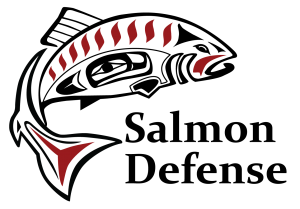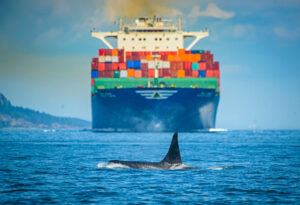Get Involved

So What Can You Do?
There are many ways to help our orcas. Just find something that interests you and dive in (no pun intended)!
In the Community
-
Become a Salmon Warrior
 Everyone can help with salmon recovery. Together we have the power to protect Washington salmon for our economy, our culture and, most importantly, our kids.
Everyone can help with salmon recovery. Together we have the power to protect Washington salmon for our economy, our culture and, most importantly, our kids.-
Participate in Orca Action Month
 Celebrated in June, this month features a broad range of activities to celebrate orcas and an opportunity to reflect on the plight of these fragile creatures.
Celebrated in June, this month features a broad range of activities to celebrate orcas and an opportunity to reflect on the plight of these fragile creatures.-
Join Orca Recovery Day
 Sponsored by the Puget Sound conservation districts, this statewide event in the fall mobilizes dozens of organizations and thousands of people to engage in hands-on activities to restore habitat for orca recovery.
Sponsored by the Puget Sound conservation districts, this statewide event in the fall mobilizes dozens of organizations and thousands of people to engage in hands-on activities to restore habitat for orca recovery.-
Report Whale Sightings

All mariners and members of the public are encouraged to report whale sightings as soon as possible through the WhaleReport app (available on Apple or Google devices).
-
Report a Stranded Whale

Photograph by Paul Cottrel, Fisheries and Oceans Canada
If you spot an orca or other marine mammal on shore that is unable to return to the water under its own power, report the stranding to the West Coast Region stranding hotline: 1-866-767-6114.
Learn more at the West Coast Marine Stranding Network.
-
Join a Work Party

Find a volunteer opportunity on the Web site podmatch.com
-
Volunteer with Fisheries Enhancement Groups
 The fisheries enhancement groups create partnerships with local, state, and federal agencies; tribes; local businesses; community members; and landowners. Volunteers can learn about salmon habitat, plant trees, count returning salmon, perform habitat assessments, conduct water quality monitoring, teach others about salmon habitat, and much more.
The fisheries enhancement groups create partnerships with local, state, and federal agencies; tribes; local businesses; community members; and landowners. Volunteers can learn about salmon habitat, plant trees, count returning salmon, perform habitat assessments, conduct water quality monitoring, teach others about salmon habitat, and much more.Find opportunities in your community to see how you might volunteer to help increase salmon populations, the orcas’ main source of food.
-
Learn How to Help Salmon

Photograph by Norbert Woloszyn
Visit the State of Salmon in Watersheds Web site to learn more about what you can do as an individual to improve salmon habitat.
-
Become a Salmon Steward
 Join the movement to protect Washington’s salmon. We can envision salmon populations that coexist with a growing population of people. To realize this future, we can make small changes every day to support salmon in our community. What is good for salmon ultimately will benefit every living thing in this special place we share. We can’t imagine a Washington without salmon. Can you? Become a salmon steward.
Join the movement to protect Washington’s salmon. We can envision salmon populations that coexist with a growing population of people. To realize this future, we can make small changes every day to support salmon in our community. What is good for salmon ultimately will benefit every living thing in this special place we share. We can’t imagine a Washington without salmon. Can you? Become a salmon steward.
At Home
-
Make a Pledge to Protect our Waters
 The pledge has 10 simple steps you can take to help protect our waters. Check off the items you can do on this Washington Department of Ecology pledge.
The pledge has 10 simple steps you can take to help protect our waters. Check off the items you can do on this Washington Department of Ecology pledge.-
Learn What to Do in Your Neighborhood
 From taking care of your yard in an environmentally friendly way, to picking up your dog’s poop, the Washington State Department of Ecology provides a list of things you can do easily in your own neighborhood to help protect the environment the orcas need.
From taking care of your yard in an environmentally friendly way, to picking up your dog’s poop, the Washington State Department of Ecology provides a list of things you can do easily in your own neighborhood to help protect the environment the orcas need.
For Boaters
-
Killer Whale Resources and Regulations

Photograph by Alan Niles, Pacific Whale Watch Association
The Washington Department of Fish and Wildlife’s killer whale resources and regulations for boaters, including frequently asked questions.
-
Be Whale Wise

Be Whale Wise provides information about the marine mammal laws and guidance to help you boat more safely and take care of our natural resources. Understand the different laws in the United States and Canada.
-
Get Your Whale Warning Flag

Photograph by Jeanne Hyde
The flag warns boaters when whales are near so they can slow down, be prepared to change course, and follow Be Whale Wise guidelines. Read more about the Whale Warning Flag Program.
-
Give Space and Take a Pledge
 Studies show that getting closer than a half nautical mile (1,000 yards) to endangered Southern Residents disturbs these vulnerable animals, interrupting their ability to find food, rest, and tend their young. Give Them Space and take a voluntary pledge to not get close to J, K and L pods in the Salish Sea. Give them Space is a joint initiative led by The Whale Trail, Seattle Aquarium, Washington Environmental Council, Center for Biological Diversity, and Friends of the San Juans.
Studies show that getting closer than a half nautical mile (1,000 yards) to endangered Southern Residents disturbs these vulnerable animals, interrupting their ability to find food, rest, and tend their young. Give Them Space and take a voluntary pledge to not get close to J, K and L pods in the Salish Sea. Give them Space is a joint initiative led by The Whale Trail, Seattle Aquarium, Washington Environmental Council, Center for Biological Diversity, and Friends of the San Juans.-
Learn How to Boat Safely Around Orcas
 The Soundwatch Boater Education Program is aimed at preventing boats from disturbing orcas and other marine wildlife in the central Salish Sea.
The Soundwatch Boater Education Program is aimed at preventing boats from disturbing orcas and other marine wildlife in the central Salish Sea.-
Volunteer as a Vessel of Opportunity During Oil Spills
Oil spills are toxic and can cause both acute and chronic health problems to whales. The Spill Prevention, Preparedness, and Response Program works with stakeholders, communities, and tribes to create programs that decrease the effect of potential oil spills on endangered Southern Resident Killer Whales. Vessels of Opportunity may be local commercial or recreational vessels identified to help respond to large oil spills in Washington, a rare but potentially devastating occurrence. Vessel owners who volunteer will supplement the system of organized, professional spill responders already in place throughout the state.
Top photograph by Jeanne Hyde


